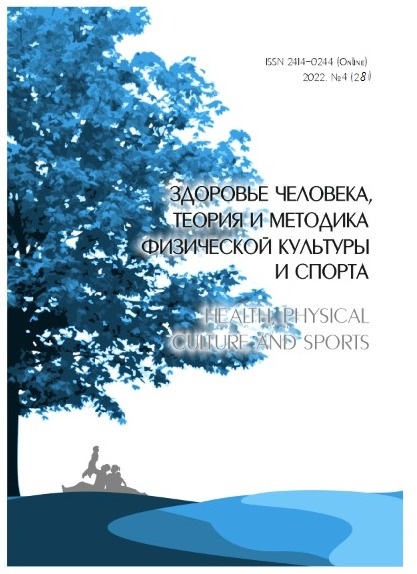ATTITUDE TO PHYSICAL CULTURE AND SPORTS ACTIVITIES AMONG STU-DENTS OF VARIOUS FACULTIES OF ALTAI STATE UNIVERSITY
Abstract
Determining the attitude to physical culture and sports activities of students of various specialties within the same university is an important condition for improving the effectiveness of the process of physical education. To solve this problem, the appropriate methodology was used, previously tested on students of the Altai State University. Its semantic basis is based on the allocation of such factors as: awareness of the importance of physical culture, sports for the implementation of the most important aspects of his life; the degree of understanding of the importance of physical culture as a type of culture, a separate field of knowledge, an important sphere of human social existence; the nature of the attitude to the subjects "Physical culture and sports", "Elective disciplines in physical culture and sports", which is the basis of physical culture and sports education; the magnitude of the accumulated potential of factors of readiness for effective practical activity in the field under consideration.
According to the results of the study, the following can be noted. The overall value of the productive attitude to physical culture and sports activities of all the surveyed students of Altai State University was 109.6 points (30.5). This indicates the average level of the parameter under study. Moreover, in the first year this value was 110.5 (32.2), and in the second 108.5 (28.9) points, which indicates the absence of statistically pronounced differences (P>0.05).
Considering the contingent of students depending on the future profession, it was noted that the most pronounced productive attitude to physical culture and sports activity was demonstrated by the future chemists 129.7 (15.8), psychologists 128.6 (15.3), sociologists 122.9 (17.4). Average indicators were observed among geographers 114.4 (17.0), art historians 113.4 (30.0), philologists 108.3 (26.2), journalists 106.2 ( 29.8). In this regard, we can note approximately equal results for all selected groups of students and assume that the characteristics of the contingent of students in these conditions do not have a pronounced effect on the quality under study, which allows us to talk about the uniformity of the educational process at the university scale.
Thus, it can be noted that there is an average value of assessing the attitude to physical culture and sports activity among first and second-year students of the Altai State University. The study showed that representatives of various groups of students are quite effective, at about the same pace, mastering the values of physical culture. This circumstance gives reason to note once again how important an individual approach is in the pedagogical process under study, stimulates the search for adequate methods of effective implementation of individualization in the conditions of the typical construction of educational activities.
Downloads
References
Белоуско Д. В. Определение отношения студентов к физкультурно-спортивной дея-тельности // Здоровье человека, теория и методика физической культуры и спорта. 2016. № 2. С. 63-67. URL: http://journal.asu.ru/zosh/article/view/1624.
Волкова Л. М., Шалупин В. И., Родионова И. А. Физическая культура как фактор формирования социального здоровья студентов авиационных вузов // Здоровье человека, теория и методика физической культуры и спорта. 2020. № 18. С. 23-28. URL: http://journal.asu.ru/zosh/article/view/7946
Воронцов П.Г., Дейс Д.А., Лобыгина Н.М., Недорезков К.В. Ценностный потенциал физической культуры в системе профессиональной подготовки студентов медицинского университета // Философия образования. 2020. №1. С. 81-93.
Ирхин В.Н., Гут Ю.Н., С.А. Корнеева, С.В. Рыльский Отличительные особенности мотивации к занятиям по физической культуре студентов первых и выпускных курсов // Теория и практика физической культуры. 2022. №3. С. 53
Оплетин А.А. Педагогическая система саморазвития личности студентов в совре-менном образовательном процессе физической культуры вуза // Теория и практика физиче-ской культуры. 2022. №3. С. 106
Пономарев А.В., Попова Н.В., Осипчукова Е.В., Ладыгина О.В. Отношение к физиче-ской культуре студентов инженерного профиля как фактор высокой конкурентоспособности // Теория и практика физической культуры. 2022. №2. С. 52
Снежицкий П.В. Двигательно-поведенческий аспект физической культуры личности в сельском сообществе // Здоровье человека, теория и методика физической культуры и спорта. 2021. № 4. С. 4-24. URL: http://journal.asu.ru/zosh/article/view/10666
Спирина Е.В., Зарубина В.В. Мотивационно-психологическое восприятие обучаю-щимися занятий по физической культуре // Теория и практика физической культуры. 2022. №1. С. 42
Усцелемова Н. А., Усцелемов С. В. Изучение опыта физкультурно-спортивной дея-тельности студентов технического вуза // Здоровье человека, теория и методика физической культуры и спорта. 2020. № 3. С. 86-96. URL: http://journal.asu.ru/zosh/article/view/8133
An author should not normally publish manuscripts describing essentially the same research in multiple journals or publication venues. Such redundant publication is generally considered to constitute unethical publishing behavior, and if discovered may result in a manuscript under consideration being rejected, or a published article being retracted.
Authors of manuscripts reporting on original research should present an accurate account of the work performed, accompanied by an objective discussion of its significance. Underlying data should be represented accurately in the manuscript. The manuscript should contain sufficient detail and references to permit others to replicate the work. The fabrication of results and the making of fraudulent or knowingly inaccurate statements constitute unethical behavior and may be cause for rejection or retraction of a manuscript or published article.





